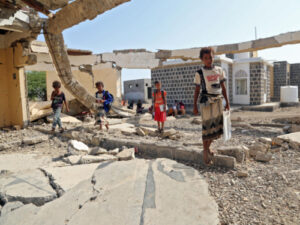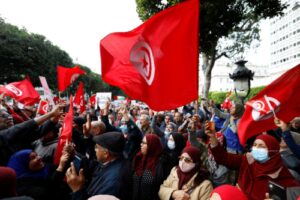
The National Interest Foundation Newsletter
Issue 173, December 15, 2022
Welcome to our NIF Newsletter. In this week’s headlines: a new United Nations report reveals that an alarming number of at least 11,000 children have been killed or maimed in the Yemeni conflict, Morocco makes a historic run to the 2022 FIFA World Cup semi-finals, and hundreds of Tunisians take to the streets in continued protests against President Saied ahead of planned controversial parliamentary elections.
Devastating Effect of the Yemeni Conflict on Children

Many of the child fatalities have resulted from Saudi-led airstrikes on civilian sites including hospitals, residential homes, and markets. (Photo from AFP)
A New United Nations Report Reveals That an Alarming Number of at Least 11,000 Children Have Been Killed or Maimed in the Yemeni Conflict
A recent report released by the United Nations Children’s Fund (UNICEF) has drawn attention to the extent of the disturbing impact that the longstanding Yemeni conflict has had on the country’s child population. The agency stated that a troubling figure of more than 11,000 children have been killed or injured, including at least 62 in the period since the expiration of a 6-month long truce back in early October. Distressingly, due to the fact that it only consists of UN-verified information, officials have acknowledged that the actual numbers are likely even higher. The conflict in Yemen has had a catastrophic effect on children and other civilians, resulting in not only deplorable deaths and injuries, but also the destruction of infrastructure, acute malnutrition, massive levels of food insecurity, and reliance on humanitarian assistance. Analysts and observers have long pointed to the damaging role that Saudi-led airstrikes have played in exacerbating this array of negative humanitarian consequences, particularly in regards to children. UNICEF representatives have expressed the need for a renewal of the truce in Yemen in order to allow for further efforts aimed at alleviating the dire humanitarian crisis.
The alarming figures associated with the ongoing humanitarian crisis in Yemen are truly staggering. Now nearly eight years since the outbreak of the conflict back in late 2014, it is estimated that a shocking more than 23.4 million people are in need of humanitarian aid – including close to 13 million children. Over two million children in the country are acutely malnourished, of which more than half a million are under the age of five. Additionally, at least 17.8 million civilians, including over 9 million children, lack access to safe water, sanitation, and hygiene services. This is largely due to Saudi-led airstrikes and years of bombardment that have severely crippled Yemen’s health system and infrastructure. Low levels of immunization combined with inadequate access to safe water sources have left children extremely susceptible to frequent outbreaks of diseases like cholera and measles. Yemen also faces a significant education crisis, with millions of children out of school, as experts estimate that at least one out of every four schools in the war-torn nation are either partially damaged or completely destroyed.
Peace activists have outlined how an extension of the truce in Yemen would allow aid agencies to more easily access Yemeni civilians who are in desperate need of humanitarian assistance. Thus, back in early October, there was extreme disappointment that Yemen’s warring parties were unable to do so again, in contrast to previous months. The initial two-month long ceasefire was agreed upon in April, and was renewed for the same period of time twice both in early June and in early August. However, it expired and there was a failure to extend it at the beginning of October, despite calls for a further six-month renewal – which experts stated would have helped continue the upwards trajectory towards making critical humanitarian-related improvements in Yemen. In fact, during the six months when it was in place between April and October of this year, aid workers had noted how prolonged access to harder-to-reach areas and the removal of the threat of debilitating aerial bombardment and fighting on the ground had paved the way for some important improvements on infrastructure and day-to-day life for ordinary civilians including, most critically, children.
Ultimately, it is hoped that continued focus on the plight of children and civilians there will spur the attempts to initiate a prolonged truce and cessation of hostilities in Yemen.
Morocco’s Historic Run at the 2022 FIFA World Cup

Morocco made history by becoming both the first African and first Arab nation to reach the semi-finals of the FIFA World Cup. (Photo from Getty Images)
Morocco Makes a Historic Run to the 2022 FIFA World Cup Semi-Finals
Morocco’s magical and inspirational run at the 2022 FIFA World Cup in Qatar was ended by reigning champions France yesterday, but not before the team made history by becoming both the first African and first Arab nation to reach the semi-finals of the prestigious tournament. Morocco will now face Croatia in Saturday’s third place match, while France will seek to retain their title against Argentina in the World Cup final on Sunday. The historic Moroccan achievement comes at a time when the FIFA World Cup is being held in the Arab world for the first time ever, and the Atlas Lions not only “carried the flag” and drew unified support from the Middle East and Africa, but they also garnered the deep respect and admiration of much of the global soccer world at-large. Along the way during their incredible run, Morocco defeated several powerhouses of the sport: Belgium in the group stage, Spain in the Round of 16, and Portugal in the quarter-finals.
Morocco made history at the 2022 FIFA World Cup on multiple different fronts. Prior to this year’s FIFA World Cup, no African national team had ever advanced past the quarter-final stage of the tournament. On three separate previous occasions, teams from the continent were eliminated in this round of the competition. The first took place in 1990, when Cameroon made it to the quarter-finals but then lost to England. The same fate befell Senegal in 2002 and Ghana in 2010, when they were ultimately eliminated by Turkey and Uruguay, respectively. In addition to becoming the first African team to reach the semi-finals of the World Cup, the 2022 Moroccan team also made history as the first Arab nation to do so as well. Before this year’s tournament, no Arab nation had ever even advanced to the quarter-final stage, let alone the semi-final one. While host country Qatar had a poor showing, losing all three of their group stage games and thus failing to advance to the knockout rounds, other Arab national teams certainly made up for this and ensured a memorable and historic tournament for the region’s participants. On top of Morocco’s magical run to the semi-finals, Saudi Arabia defeated Argentina in their first group game, and Tunisia defeated France in their last group game. Ironically enough, it is these two national teams that suffered losses to Arab nations that will face off on Sunday in the 2022 FIFA World Cup final.
The Moroccan team at this 2022 FIFA World Cup not only instilled pride and earned a great deal of respect among their fans and lovers of the sport in general, but they also proved that nations from outside of the traditional soccer powerhouses can succeed on the highest level. A collective of selfless players who embodied true team spirit and public displays of solidarity with the Palestinian cause helped contribute to the wide array of support and admiration that they earned during the course of the tournament. Morocco was undoubtedly the feel-good fairy tale story of this year’s World Cup, and their historic run will certainly inspire others like them to dream of future prospects for success at the world’s biggest sports competition.
Continued Protests Against President Saied in Tunisia

Many Tunisians are protesting against the undemocratic measures initiated by Saied, as opposition groups call for a boycott of the controversial upcoming election. (Photo from Reuters)
Hundreds of Tunisians Take to the Streets in Continued Protests Against President Saied Ahead of Planned Controversial Parliamentary Elections
Protests have continued in Tunisia, as hundreds turn out to denounce President Kais Saied and his undemocratic actions. The demonstrations come in the lead-up to a scheduled parliamentary election this Saturday, December 17th that many, including the Tunisian opposition, consider illegitimate. These entities point out that the election will be held under the supervision of a biased and partial group that is loyal to Saied, tainting the results, and are therefore urging for a boycott. Among those advocating for this is the powerful and influential Tunisian labor union, UGTT. Concern of fraudulent elections is justified, as Saied has been rolling back Tunisian democratic institutions over the past 17 months. During this time, he has dissolved and shut down the parliament, removed judicial watchdog groups, and re-written the constitution to accrue more individual powers. This modified version of the constitution was only voted for by about a quarter of registered voters a few months ago, in a vote that was also largely boycotted by pro-democracy forces. Saied has been ruling by decree since instituting a power-grab back in July of 2021.
The International Commission of Jurists’ Regional Director Said Benarbia warned that the new constitution “defeats the very idea of separation of powers and checks and balances.” He added that the “proposed constitution provides for an unbridled presidential system, with an omnipotent president, a powerless parliament, and a toothless judiciary.” Saied has attempted to claim that his actions are necessary in order to save the country from economic and political ruin, but critics have rightfully dismissed this as a mere ruse to attain more authoritarian-like powers. The major political entities are boycotting the vote, but who is actually elected to the parliament will likely have little effect on how the country is actually governed anyway, as the legislature has lost nearly all of its power to the president. As there are few checks and balances now within the new Tunisian constitution, Saied is seeking to rule unilaterally without any worry of oversight or opposition from other government forces.
All of this is happening as a growing economic crisis looms for many Tunisians, with supply shortages and rampant inflation already causing hardship. Despite his many critics, Saied still has support from some Tunisians who see him as a “man of the people” fighting political elites who they blame for the poor socioeconomic conditions. Economic crises are a common tool used by authoritarian leaders to gain power with populist ideals and false promises, and observers have outlined how this appears to be no different in Tunisia. In these cases, leaders try to justify their undemocratic actions as a means to a better end, promising that they will relent power once the crisis has been resolved. In reality, however, they very often retain these powers and use their position to enrich themselves. This trend can be seen throughout the world in many instances. The less stable a country’s economic and social system is, the more likely that they can succumb to leaders with authoritarian tendencies. These dictatorial figures sometimes even continue to go through the motions of a supposed democracy, by for example, holding elections with little to no real impact on how the country will actually be governed. For this reason, it is important that the United States works to uphold true democratic ideals and principles in its dealings around the world.
Enter the text or HTML code here
